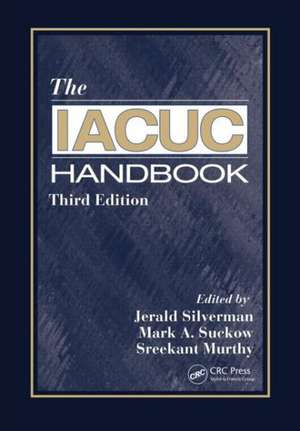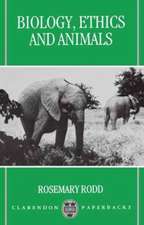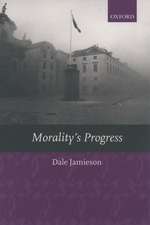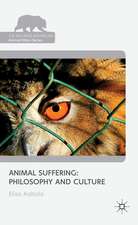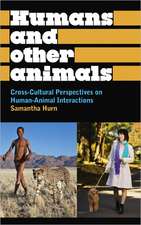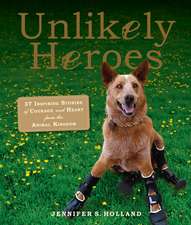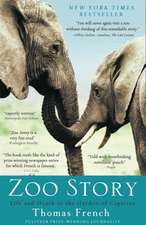The IACUC Handbook
Editat de Jerald Silverman, Mark A. Suckow, Sreekant Murthyen Limba Engleză Hardback – 20 mai 2014
This Third Edition comprehensively addresses the significant changes in the pertinent regulatory environment and interpretation of applicable federal laws, regulations, and policies. It provides multiple references and commentary on the new edition of the Guide for the Care and Use of Laboratory Animals, the new AVMA Guidelines for the Euthanasia of Animals: 2013 Edition, and the Office of Laboratory Animal Welfare’s Frequently Asked Questions. The Third Edition also features an updated survey of IACUC practices from institutions around the United States, offering wisdom gained from their experience. In addition, it includes a chapter that provides an international perspective on how animal welfare reviews can function in other countries.
Preț: 518.18 lei
Preț vechi: 693.20 lei
-25% Nou
Puncte Express: 777
Preț estimativ în valută:
99.15€ • 103.52$ • 82.06£
99.15€ • 103.52$ • 82.06£
Carte tipărită la comandă
Livrare economică 05-19 aprilie
Preluare comenzi: 021 569.72.76
Specificații
ISBN-13: 9781466555648
ISBN-10: 1466555645
Pagini: 827
Ilustrații: 15 black & white tables
Dimensiuni: 178 x 254 x 48 mm
Greutate: 1.63 kg
Ediția:Revised
Editura: CRC Press
Colecția CRC Press
ISBN-10: 1466555645
Pagini: 827
Ilustrații: 15 black & white tables
Dimensiuni: 178 x 254 x 48 mm
Greutate: 1.63 kg
Ediția:Revised
Editura: CRC Press
Colecția CRC Press
Public țintă
Professional ReferenceCuprins
Introduction. Origins of the IACUC. Circumstances Requiring an IACUC. Creation of an IACUC. Reporting Lines of the IACUC. General Composition of the IACUC and Specific Roles of the IACUC Members. Frequency and Conduct of Regular IACUC Meetings. General Format of IACUC Protocol Forms. Submission and Maintenance of IACUC Protocols. General Concepts of Protocol Review. Amending IACUC Protocols. Continuing Review of Protocols. Justification for the Use of Animals. Justification of the Number of Animals to Be Used. Animal Acquisition and Disposition. Animal Housing, Use Sites, and Transportation. Pain and Distress. Euthanasia. Surgery. Antigens, Antibodies, and Blood Collection. Occupational Health and Safety. Personnel Training. Confidential and Proprietary Information. General Concepts of the Program Review and Facility Inspection. Inspection of Animal Housing Areas. Inspection of Individual Laboratories. Inspection of Surgery Areas. Assessment of Veterinary Care. Laboratory Animal Enrichment. Animal Mistreatment and Protocol Noncompliance. Postapproval Monitoring. The European Ethical Review Framework: Collaborative Issues. Index.
Notă biografică
Jerald Silverman, DVM, is director of the Department of Animal Medicine and professor of pathology at the University of Massachusetts Medical School. He is also an adjunct professor at the Cummings School of Veterinary Medicine at Tufts University. He received his degrees in vertebrate zoology and veterinary medicine from Cornell University and has a master’s degree in nonprofit organization management from the New School for Social Research. Dr. Silverman is a Diplomate of the American College of Laboratory Animal Medicine and past president of the American Society of Laboratory Animal Practitioners.
Mark Suckow, DVM, is assistant vice president for research at the University of Notre Dame, Notre Dame, Indiana. He received his DVM from the University of Wisconsin in 1987, and completed a post-doctoral residency program in laboratory animal medicine at the University of Michigan in 1990. He is a Diplomate of the American College of Laboratory Animal Medicine. Dr. Suckow is active in professional organizations and has served as president of both the American Association for Laboratory Animal Science (AALAS) and the American Society of Laboratory Animal Practitioners (ASLAP). He currently serves as a member of the AAALAC Council on Accreditation.
Sreekant Murthy, PhD, is professor of medicine, adjunct professor of biomedical engineering, and senior associate vice provost for research compliance (retired) at Drexel University. He recently joined Rowan University, Glassboro, New Jersey, as their chief research compliance officer. He earned his doctoral degree from Philadelphia College of Pharmacy, currently known as University of Sciences, Philadelphia. As a faculty member he simultaneously chaired two IACUCs in the same institution for five years. As the senior associate vice provost, he managed research compliance in human subject research, animal welfare, institutional biosafety committee, radiation safety, and research integrity. He has been the institutional official for the IACUC since 2006. At Rowan University, he continues to be responsible for all aspects of research compliance, research integrity, and export control.
Mark Suckow, DVM, is assistant vice president for research at the University of Notre Dame, Notre Dame, Indiana. He received his DVM from the University of Wisconsin in 1987, and completed a post-doctoral residency program in laboratory animal medicine at the University of Michigan in 1990. He is a Diplomate of the American College of Laboratory Animal Medicine. Dr. Suckow is active in professional organizations and has served as president of both the American Association for Laboratory Animal Science (AALAS) and the American Society of Laboratory Animal Practitioners (ASLAP). He currently serves as a member of the AAALAC Council on Accreditation.
Sreekant Murthy, PhD, is professor of medicine, adjunct professor of biomedical engineering, and senior associate vice provost for research compliance (retired) at Drexel University. He recently joined Rowan University, Glassboro, New Jersey, as their chief research compliance officer. He earned his doctoral degree from Philadelphia College of Pharmacy, currently known as University of Sciences, Philadelphia. As a faculty member he simultaneously chaired two IACUCs in the same institution for five years. As the senior associate vice provost, he managed research compliance in human subject research, animal welfare, institutional biosafety committee, radiation safety, and research integrity. He has been the institutional official for the IACUC since 2006. At Rowan University, he continues to be responsible for all aspects of research compliance, research integrity, and export control.
Recenzii
"The IACUC Handbook is the best all-in-one source for information relevant to the operation of an IACUC. I like that it implicitly recognizes that all institutions do things differently; hence the surveys following many of the discussions. These are essential benchmarks for us, relieving us of hours of research. I estimate that the number of questions that this book doesn’t address for us is probably well below 5 percent. The current editors have done an astounding job putting together the third edition. It’s come a long way since the first edition (which itself was incredibly useful). I wouldn’t change anything."
- Michael C. Kessler, Director of Regulatory Affairs, Institutional Animal Care and Use Committee (IACUC), University of Pittsburgh
"Similar to the earlier two editions, the 3rd edition of The IACUC Handbook continues the excellent tradition of providing guidance for IACUCs and administrators of animal care and use programs. The editors have done a great job of putting together a group of industry experts to provide advice on how to handle several key features of the laws and regulations that are currently in place. The key feature to me as a reader is the Q&A format of the book that makes it very user friendly, even for readers that are not subject matter experts in the regulations. Overall, in my opinion the new edition…is a very valuable and timely resource for all institutions that have an animal care program and the authors should be commended for taking on this huge task to provide guidance to the industry."
—Jeetendra Eswaraka, DVM, PhD, Amgen, Thousand Oaks, California, in Laboratory Animal Practitioner
"While the first and second editions examine rules, regulations, and guidelines relevant to the United States, this edition also includes a new chapter examining the regulation of animal research in Europe and the European Union. Considering the globalization of today’s world and increasing international collaborations, this chapter is an important addition…. The volume would be useful on the shelf of anyone involved with an animal use program…. Members of the laboratory animal science community must continually respond to changes in order to maintain a high-quality program of animal care. This reference will make that task a little easier."
—Nancy Johnston, DVM, DACLAM, Assistant Director, Laboratory Animal Resource Center, Indiana University School of Medicine, in Laboratory Animal Science Professional
"This handbook provides a comprehensive collection of best practices; all of which are compliant with the federal guidelines and requirements. The sections labeled "regulatory" have been reviewed by staff at NIH Office of Laboratory Animal Welfare (OLAW) and USDA APHIS/Animal Care (AC) for consistency and compliance with the PHS Policy and the USDA Animal Welfare Act Regulations (AWAR).
The best practices presented were developed by conscientious IACUCs and research teams from academia, industry, the private and public sectors, and institutions of various sizes. Answers to a series of operational, policy, and management questions are first addressed from the perspective of the applicable regulatory language, followed by opinions from knowledgeable and experienced professionals in the field, and in some cases ultimately followed by responses to informal surveys on selected institutional policies and practices.
Every effort has been made to apply correct interpretations within the context of the specific issues being discussed. …
For the experienced reader and novice alike, this book provides a wealth of useful information and insight into the collective experience and wisdom of the numerous expert editors and authors. Both NIH/OLAW and APHIS/AC commend the authors and editors for their outstanding efforts and for moving the biomedical research community forward in its formulation of best practices and commonly accepted professional guidance in this complex arena."
—From the Introduction by
Dr. Patricia A. Brown, Director of the Office of Laboratory Animal Welfare
Dr. Chester A. Gipson, Deputy Administrator USDA/APHIS/Animal Care
- Michael C. Kessler, Director of Regulatory Affairs, Institutional Animal Care and Use Committee (IACUC), University of Pittsburgh
"Similar to the earlier two editions, the 3rd edition of The IACUC Handbook continues the excellent tradition of providing guidance for IACUCs and administrators of animal care and use programs. The editors have done a great job of putting together a group of industry experts to provide advice on how to handle several key features of the laws and regulations that are currently in place. The key feature to me as a reader is the Q&A format of the book that makes it very user friendly, even for readers that are not subject matter experts in the regulations. Overall, in my opinion the new edition…is a very valuable and timely resource for all institutions that have an animal care program and the authors should be commended for taking on this huge task to provide guidance to the industry."
—Jeetendra Eswaraka, DVM, PhD, Amgen, Thousand Oaks, California, in Laboratory Animal Practitioner
"While the first and second editions examine rules, regulations, and guidelines relevant to the United States, this edition also includes a new chapter examining the regulation of animal research in Europe and the European Union. Considering the globalization of today’s world and increasing international collaborations, this chapter is an important addition…. The volume would be useful on the shelf of anyone involved with an animal use program…. Members of the laboratory animal science community must continually respond to changes in order to maintain a high-quality program of animal care. This reference will make that task a little easier."
—Nancy Johnston, DVM, DACLAM, Assistant Director, Laboratory Animal Resource Center, Indiana University School of Medicine, in Laboratory Animal Science Professional
"This handbook provides a comprehensive collection of best practices; all of which are compliant with the federal guidelines and requirements. The sections labeled "regulatory" have been reviewed by staff at NIH Office of Laboratory Animal Welfare (OLAW) and USDA APHIS/Animal Care (AC) for consistency and compliance with the PHS Policy and the USDA Animal Welfare Act Regulations (AWAR).
The best practices presented were developed by conscientious IACUCs and research teams from academia, industry, the private and public sectors, and institutions of various sizes. Answers to a series of operational, policy, and management questions are first addressed from the perspective of the applicable regulatory language, followed by opinions from knowledgeable and experienced professionals in the field, and in some cases ultimately followed by responses to informal surveys on selected institutional policies and practices.
Every effort has been made to apply correct interpretations within the context of the specific issues being discussed. …
For the experienced reader and novice alike, this book provides a wealth of useful information and insight into the collective experience and wisdom of the numerous expert editors and authors. Both NIH/OLAW and APHIS/AC commend the authors and editors for their outstanding efforts and for moving the biomedical research community forward in its formulation of best practices and commonly accepted professional guidance in this complex arena."
—From the Introduction by
Dr. Patricia A. Brown, Director of the Office of Laboratory Animal Welfare
Dr. Chester A. Gipson, Deputy Administrator USDA/APHIS/Animal Care
Descriere
As biomedical research continues to grow, the role and impact of the Institutional Animal Care and Use Committee (IACUC) has increased in scope and complexity. The IACUC Handbook has become "the Bible" for individuals when the time comes for them to serve on their institutions’ IACUC. It provides a foundation for understanding and implementing the many and varied responsibilities of this committee. This third edition comprehensively addresses the significant changes in the pertinent regulatory environment and interpretation of applicable federal laws, regulations, and policies.
